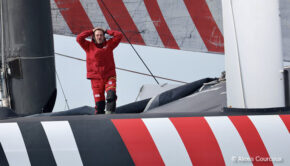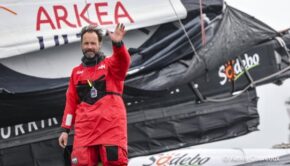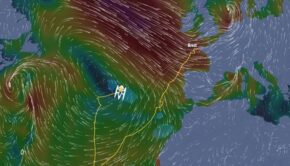Closure for 14,000nm Brest Atlantiques
Published on December 7th, 2019
(December 7, 2019) – After 31 days, 20 hours, 43 minutes and 50 seconds at sea, François Gabart and Gwénolé Gahinet took second place in the 14,000nm Brest Atlantiques. MACIF crossed the finish line today at 07:43:50, 2 days, 21 hours, 19 minutes and 4 seconds after the winner, Maxi Edmond de Rothschild, having covered 17,890 miles at an average speed of 23.4 knots. At 12:29:22, 4 hours, 45 minutes and 32 seconds later, Actual Leader crossed the line to bring the race for Ultim 32/23 Class trimarans to a close.
The Brest Atlantiques race had fans glued to the website, constantly checking the latest updates over the nail-biting final hours. MACIF managed to hold on to second place, which they had been in ever since passing Cape Town, fighting off Actual Leader’s attempts to overtake.
Having past Robben Island on November 21, 14 hours and 28 minutes behind the leader Maxi Edmond de Rothschild, and 3 hours and 11 minutes behind Actual Leader, François Gabart (36 years old) and Gwénolé Gahinet (35 years old), accompanied by media man Jérémie Eloy (41 years old), gradually gained on the Yves Le Blevec/Alex Pella pair along the Namibian coast, before opting for a more westerly option in the mid-South Atlantic.
A strategy which, although it meant the two skippers had to cross a front and take a considerably longer route, finally paid off, as it allowed them to reach the Northern Hemisphere 2 hours and 32 minutes ahead of Actual Leader.
“This was a good option for us, and we really have to thank our weather routing team, made up of Jean-Yves Bernot and Julien Villion. It wasn’t easy, because we spent three to four days heading west, not really in the direction of Brest, but in the end, it really paid off. We are proud of sticking to our guns,” explains Gahinet just after MACIF’s arrival at the pontoon in Brest on Saturday morning.
Despite two technical pitstops in Rio and then Cape Town, MACIF managed to fight off their rivals’ attempts to overtake. In fact, François Gabart managed to keep secret for the entire month the level of damage suffered to the boat.
First, a damaged daggerboard which meant they were not able to foil, then a central rudder which was out of action for a large part of the race, and finally their starboard rudder which became damaged when sailing along the Namibian coast. “It was very frustrating, because you know from training how fast the boat can really go, but now it wasn’t moving. It was pretty difficult to deal with,” explains Gabart.
Back in close contact at the start of the week to the west of the Azores high, Actual Leader remained a constant threat to MACIF who, at the price of a thrilling final and after a series of gybes on the approach to Brittany, finally crossed the finish line today at 07:43:50, completing the course in 31 days, 20 hours, 43 minutes and 50 seconds (having covered 17,890 miles at an average of 23.4 knots).
“It wasn’t easy, but we could see that we could sail to Brest safely and focus on getting second place,” explains Gabart. A further string to the bow for MACIF which, since its launch on 18 August 2015, won the solo round the world record in December 2017, as well as finishing on the podium of all the major offshore races in which it has competed, including victories in the Transat Jacques Vabre 2015, the Transat 2016 and The Bridge 2017, as well as placing second in the Route du Rhum 2018.
Finally, at 4 hours, 45 minutes and 32 seconds after MACIF, at 12:29:22, Actual Leader completed the podium of Brest Atlantiques. Yves Le Blevec and Alex Pella, the only ones not to have made a pit-stop, completed the race in 32 days, 1 hour, 29 minutes and 22 seconds, and covered a total of 17,061 miles, at an average speed of 22.17 knots. A great reward for the two skippers whose priority during this big month at sea was to preserve their boat. It certainly paid off, as it allowed them to stay in the game from start to finish….
DNF: Thomas Coville and Jean-Luc Nélias retired on November 22 while in Cape Town when it was determined that the damages to Sodebo Ultim 3 were too serious to carry on safely. Details.
Event details – Race brochure – Tracker – YouTube
The race sent these doublehanded speedsters on a course from Brest that turned at Rio de Janeiro (Brazil) and Cape Town (South Africa) before returning to Brest. The Ultim Class is for trimarans with a maximum length of 32 meters and a maximum width of 23 meters.
The turning marks saw the boats leave to port the chain of Cagarras Islands, in front of the famous Ipanema beach in the Bay of Rio and Robben Island off the coast of Cape Town, where Nelson Mandela was imprisoned for 18 years.
It was an unprecedented course, lined with several weather traps, especially along The Cape, a route almost never taken in offshore racing.
Each entry was skippered by four fantastic pairs and accompanied by a media man who was not allowed to take an active role in the performance of the boat. The teams were:
• Actual Leader: Yves Le Blévec/Alex Pella
• Maxi Edmond de Rothschild: Franck Cammas/Charles Caudrelier
• MACIF: François Gabart/Gwénolé Gahinet
• Sodebo Ultim 3: Thomas Coville/Jean-Luc Nélias
Source: BREST ULTIM SAILING










 We’ll keep your information safe.
We’ll keep your information safe.